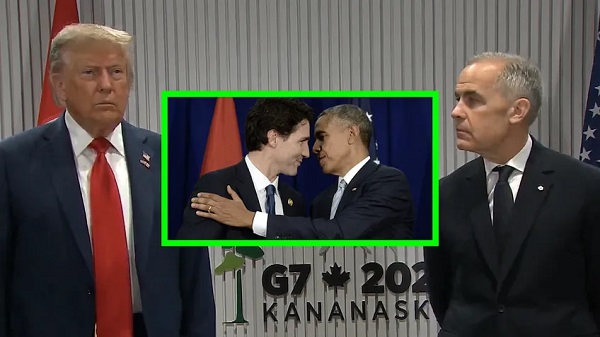Energy
Meet the BC Liberal MLA fighting against #ShutDownCanada activists

Ellis Ross is the MLA for Skeena in British Columbia.
Liberal MLA Ellis Ross is BC’s Official Opposition Critic for LNG and Resource Opportunities. He posts videos to keep an ongoing conversation up with his constituents, his province, and his country.
This post from February 25 shows his frustration at the state of communication and understanding in Canada. It’s been seen over 350,000 times so far!
From Ellis Ross
“Canada is missing the point. I’m no racist, hypocrite, USA puppet hell bent on destroying my own country.”
Ellis Ross was elected MLA for Skeena in 2017. He currently serves as the official opposition critic for LNG and Resource Opportunities and is a Member of the Select Standing Committee on Legislative Initiatives.
Ellis served as the Minister of Natural Gas Development and Minister Responsible for Housing and has worked in both the private and public sectors, and has business experience in hand logging, beachcombing, and construction.
Ellis worked full time as a taxi boat operator until the Haisla Nation Council requested that he become their first full-time councillor. Ellis served in this position for eight years, from 2003 to 2011. In 2011, Ellis was elected Chief Councillor of the Haisla Nation, and was re-elected by acclamation in 2013.
Ellis has been recognized as a business leader by both BC Business magazine and Canadian Business magazine. In 2012, Ellis was appointed the inaugural chair of the Aboriginal Business and Investment Council. In 2014, he was the only First Nations leader among 25 Canadians invited by then-Finance Minister Jim Flaherty to a public policy and budget retreat.
In recognition of his community service, Ellis was awarded the Queen Elizabeth II Diamond Jubilee medal in 2013 and the Order of BC in 2014.
Ellis actively enjoys golf, soccer, and basketball. He has a passion for seeing people succeed in athletics, school, and life, which drove his coaching style. One of the highlights of his coaching career is coaching the Mount Elizabeth Secondary School senior girls basketball team to a zone championship.
He is a proud father of two daughters and a proud grandfather.

Band cancelling tour dates in Red Deer and two other communities after supporting protests in BC
Economy
Ottawa’s muddy energy policy leaves more questions than answers

From the Fraser Institute
Based on the recent throne speech (delivered by a King, no less) and subsequent periodic statements from Prime Minister Carney, the new federal government seems stuck in an ambiguous and ill-defined state of energy policy, leaving much open to question.
After meeting with the premiers earlier this month, the prime minister talked about “decarbonized barrels” of oil, which didn’t clarify matters much. We also have a stated goal of making Canada the world’s “leading energy superpower” in both clean and conventional energy. If “conventional energy” includes oil and gas (although we’re not sure), this could represent a reversal of the Trudeau government’s plan to phase-out fossil fuel use in Canada over the next few decades. Of course, if it only refers to hydro and nuclear (also forms of conventional energy) it might not.
According to the throne speech, the Carney government will work “closely with provinces, territories, and Indigenous Peoples to identify and catalyse projects of national significance. Projects that will connect Canada, that will deepen Canada’s ties with the world, and that will create high-paying jobs for generations.” That could mean more oil and gas pipelines, but then again, it might not—it might only refer to power transmission infrastructure for wind and solar power. Again, the government hasn’t been specific.
The throne speech was a bit more specific on the topic of regulatory reform and the federal impact assessment process for energy projects. Per the speech, a new “Major Federal Project Office” will ensure the time needed to approve projects will be reduced from the currently statutory limit of five years to two. Also, the government will strike cooperation agreements with interested provinces and territories within six months to establish a review standard of “one project, one review.” All of this, of course, is to take place while “upholding Canada’s world-leading environmental standards and its constitutional obligations to Indigenous Peoples.” However, what types of projects are likely to be approved is not discussed. Could be oil and gas, could be only wind and solar.
Potentially good stuff, but ill-defined, and without reference to the hard roadblocks the Trudeau government erected over the last decade that might thwart this vision.
For example, in 2019 the Trudeau government enacted Bill C-48 (a.k.a. the “Tanker Ban Bill”), which changed regulations for large oil transports coming and going from ports on British Columbia’s northern coast, effectively banning such shipments and limiting the ability of Canadian firms to export to non-U.S. markets. Scrapping C-48 would remove one obstacle from the government’s agenda.
In 2023, the Trudeau government introduced a cap on Canadian oil and gas-related greenhouse gas emissions, and in 2024, adopted major new regulations for methane emissions in the oil and gas sector, which will almost inevitably raise costs and curtail production. Removing these regulatory burdens from Canada’s energy sector would also help Canada achieve energy superpower status.
Finally, in 2024, the Trudeau government instituted new electricity regulations that will likely drive electricity rates through the roof, while ushering in an age of less-reliable electricity supply: a two-handed slap to Canadian energy consumers. Remember, the throne speech also called for building a more “affordable” Canada—eliminating these onerous regulations would help.
In summation, while the waters remain somewhat muddy, the Carney government appears to have some good ideas for Canadian energy policy. But it must act and enact some hard legislative and regulatory reforms to realize the positive promises of good policy.
Alberta
Unified message for Ottawa: Premier Danielle Smith and Premier Scott Moe call for change to federal policies

United in call for change: Joint statement |
“Wednesday, Alberta’s and Saskatchewan’s governments came together in Lloydminster to make a unified call for national change.
“Together, we call for an end to all federal interference in the development of provincial resources by:
- repealing or overhauling the Impact Assessment Act to respect provincial jurisdiction and eliminate barriers to nation-building resource development and transportation projects;
- eliminating the proposed oil and gas emissions cap;
- scrapping the Clean Electricity Regulations;
- lifting the oil tanker ban off the northern west coast;
- abandoning the net-zero vehicle mandate; and
- repealing any federal law or regulation that purports to regulate industrial carbon emissions, plastics or the commercial free speech of energy companies.
“The federal government must remove the barriers it created and fix the federal project approval processes so that private sector proponents have the confidence to invest.
“Starting with additional oil and gas pipeline access to tidewater on the west coast, our provinces must also see guaranteed corridor and port-to-port access to tidewater off the Pacific, Arctic and Atlantic coasts. This is critical for the international export of oil, gas, critical minerals, agricultural and forestry products, and other resources. Accessing world prices for our resources will benefit all Canadians, including our First Nations partners.
“Canada is facing a trade war on two fronts. The People’s Republic of China’s ‘anti-discrimination’ tariffs imposed on Canadian agri-food products have significant impacts on the West. We continue to call on the federal government to prioritize work towards the removal of Chinese tariffs. Recently announced tariff increases, on top of pre-existing tariffs, by the United States on Canadian steel and aluminum products are deeply concerning. We urge the Prime Minister to continue his work with the U.S. administration to seek the removal of all tariffs currently being imposed by the U.S. on Canada.
“Alberta and Saskatchewan agree that the federal government must change its policies if it is to reach its stated goal of becoming a global energy superpower and having the strongest economy in the G7. We need to have a federal government that works with, rather than against, the economic interests of Alberta and Saskatchewan. Making these changes will demonstrate the new Prime Minister’s commitment to doing so. Together, we will continue to fight to deliver on the immense potential of our provinces for the benefit of the people of Saskatchewan and Alberta.”
-

 International2 days ago
International2 days agoTrump not seeking ceasefire with Israel, Iran as he rushes back to White House
-

 Business2 days ago
Business2 days agoThe CBC is a government-funded giant no one watches
-

 conflict2 days ago
conflict2 days agoMiddle East clash sends oil prices soaring
-

 conflict2 days ago
conflict2 days agoTrump Threatens Strike on Khamenei as Israel Pounds Iranian Military Command
-

 Business2 days ago
Business2 days agoTrump makes impact on G7 before he makes his exit
-

 International14 hours ago
International14 hours agoTrump puts new price tag on Canada joining “Golden Dome”
-

 Alberta1 day ago
Alberta1 day agoAlberta health care blockbuster: Province eliminating AHS Health Zones in favour of local decision-making!
-

 Alberta11 hours ago
Alberta11 hours agoUnified message for Ottawa: Premier Danielle Smith and Premier Scott Moe call for change to federal policies





